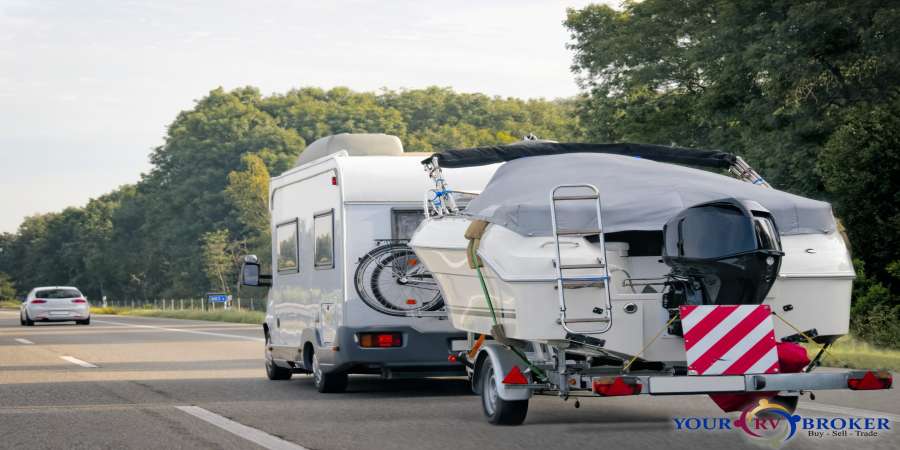Do You Need A CDL To Drive An RV In Texas?
Before you jump straight into RV ownership, make sure you brush up on all of the requirements. Depending on the type of RV you are going to be driving there may be additional legal requirements that you must meet, particularly when it comes to a driver’s license. In general, an RV is much bigger than the average vehicle on the road and they drive much differently.
Some states do require that a driver have a CDL when they register their RV. Texas, however, does not quite require a CDL for you to drive your RV on public roads. Instead, Texas will require you to have a non-CDL special license depending on the weight of the RV.
Driving An RV vs Driving A Car - Respect The RV
We must first establish a very, very important rule when operating an RV: these are not small vehicles like a sedan. Especially when you get to RV’s like a Class A, they get very large. The larger your vehicle is, the more differently they operate than your normal vehicle. This is the same concept that is taught to CDL drivers that will operate commercial trucks.
The larger an RV is, the more it will weigh. As the weight of a vehicle increases, so does the time and distance required for an RV to come to a full stop. Your RV will not have the same stopping distance as a sedan or even a pickup truck. For your safety and the safety of other drivers on the road it is imperative to remember these differences.
Likewise, an RV will also take longer to accelerate than other vehicles. The larger the vehicle, the longer it takes to accelerate to the same speed as compared to a smaller vehicle. For example, if you are at an intersection in which crossing traffic does not stop you will have to allow more space than normal in between breaks in traffic before pulling out onto the road.
Non-CDL Special Driver’s License For RV In Texas
If you require a non-CDL special driver’s license for your RV, the driver’s license class is dependent on the gross vehicle weight rating (or GVWR) or the gross combination weight rating (GVCR). The keyword here is the gross weight, so it is the weight of the vehicle itself and does not include cargo or passenger weight.
If your RV has a GVWR of more than 26,000 pounds, and you are not towing any vehicles, then you will be required to obtain a Class A non-CDL special driver’s license. Alternatively, you will also need a Class A if the combined weight of all vehicles, or the GCWR, is more than 26,000 pounds and the towed vehicle’s weight exceeds 10,000. For RV’s such as travel trailers or fifth wheels, this is likely the license that you will need.
The requirements for a Class B license is similar, but there is one key difference: the GVWR of any towed vehicle must not exceed 10,000 pounds. Remember that if you are not towing any vehicles at all, you will only need a Class A license.
If your RV weighs less than 26,000 pounds, you do not need any non-CDL special driver’s license. Your Class B and C motorhomes generally do not even come close to weighing 26,000 pounds so you likely will not have to worry about obtaining a special license for these. A Class A motorhome, however, may exceed 26,000 pounds but not always.
Understanding RV Driver Requirements In Texas
While Texas does not require a Commercial Driver License, or CDL, for the operation of an RV, a written test and a driving test are still required. Don’t stress too much about these testing requirements, though. The knowledge and skill required isn’t nearly the same as if you were trying to obtain a license to operate a semi-truck hauling cargo.
Just like the normal driver’s license testing process in Texas, you will be required to successfully complete a knowledge test first. The general knowledge that you will be tested on does come from the Texas Commercial Motor Vehicle Drivers Handbook, but remember that you will not be taking all of the same tests as someone obtaining an actual CDL. Much of the knowledge will likely seem to be common sense, but always brush up on your knowledge with the handbook.
After you pass your knowledge test, you can then schedule a driving test at a Texas driver’s license office. Your driving test does not have to be completed at the same places where you completed the written test. You should always call any testing site, whether for the written or driving test, to make sure the testing is available before taking the time to go there.
You can visit the Texas Department of Public safety website here for a list of current testing sites.
What About When You Travel To Other States?
In general, if you have the required license in the State in which you registered your RV then you should be safe to drive it in other States. It is smart, however, to read up on any specific laws regulating the operation of personal RV’s for any State you will be visiting or traveling through.
Ready to buy your first or next RV in Texas? Your RV Broker, located in Justin, Texas, carries an inventory of closely inspected used RV’s at great prices. We also offer a wide range of financing options so that everyone can get their dream RV. For questions on sales, call us at 817-409-8997.
